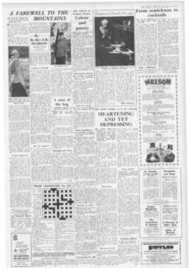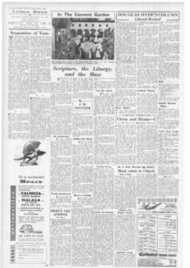Page 4, 11th April 1958
Page 4

Report an error
Noticed an error on this page?If you've noticed an error in this article please click here to report it.
Tags
Share
Related articles
Pope Calls For Renewed Study Of Bible
Why Neglect The Bible?
Meaning Of The Memorandum
The Mass And The Liturgy More Problems
Cards A Hundred Years Of The Artist Gave This Away Of...
Scripture, the Liturgy, and the Mass
By J. W.
POYNTER
AMONGST the signs of the increasing enthusiasm of Catholic life in these stormy times may be included the revived interest in the studies connected with the Bible. and the keener interest also in the Church's liturgy and matters related to it.
The liturgical movement is a subject to which the CA11.10LIC HERALD devotes particular attention. It may be useful, therefore, to give this short article to considering some aspects of the liturgy in relation to Biblical studies.
One of the most interesting developments of modern religious thought generally is in its attitude to the Christian Scriptures. When they revolted, in the 16th century, against the unity of the Catholic Church, the Protestants needed a standard by which to decide questions of doctrinal belief as opposed to the Church they were leaving.
To what could they appeal ? To rely solely on private judgment would lead only to confusion. They fell back, then. on the Bible.
Not that their so doing was merely a piece of ''strategic expediency". In fairness we must recognise that they had a genuine belief in the sacredness of the Bible; For that belief had been handed down during the centuries. and was part of the mentality of the peoples.
its authority
IT was inevitable, however, that in course of time arguments would arise about the authority of the Bible. After all, belief in the sanctity and the inspiration of the Scriptures was really just a part of the ancient tradition of the Catholic Church — which Church, moreover. had settled the " canon "—the list of which books actually go to make up the Bible.
It could not be very long, therefore—the authority of the Ancient Church having, been rejected— before the Bible itself should come under attack.
First, then, there was the dispute as to Which books composed the Bible. Most Protestants threw over a number of Old Testament books —Judith. Wisdom, the two Maccabees, etc.—which they called "the Apocrypha", but which the Catholic Church, in accordance with its old tradition. accepted as true parts of inspired Holy Writ.
Later, amongst Protestants there arose controversies even as to the inspiration and authority of the books they accepted as canonical.
The scientific discoveries and theories of the 19th century—the speculations of Charles Darwin and others—resulted. in due course, in producing a state largely of confusion amongst non-Catholics as to how they should regard the Bible.
Truly perplexed IT is true many still .11stand by their old belief in its sanctity and inspiration: but, amongst Protestants as a whole, the position is truly perplexed.
It may be said, without any unfairness, that at present the Catholic Church alone upholds. without any hesitation or doubt. the sanctity and inerrancy of the Bible; while welcoming (as seen. for example, in the recently published English "Catholic Cornmentary"—a commentary which itself is already becoming outdated in the light of Continental Catholic studies) any genuine new lights on the subject.
Belief in the Bible being, then, a part of basic Catholic theology. it is only to be expected that such belief should be found permeating the services—the liturgy—by which the Church expressed herself in public worship.
Some useful remarks on this subject can he read in a recent number of a French paper "The Church in our Time" (L'Eglise dans noire Temps). The writer in that paper says that the Missal may even be
regarded as introducing Catholics to " a Biblical culture" (Le tnissel est de plus en plus pour les litkles le point de depart dune culture biblique).
true ! Throughout the sacred liturgy of the Mass we arc brought continually into contact with the Bible and the events related therein.
Judica me, Deus
TAKE, for example, the use of the Psalms: such as Psalm 42, that tragically noble one from which came words used by Jesus on the cross: Judica me, Deus . . : " Judge me, 0 God, and distinguish my cause from the nation that is not holy."
We can call up before the eyes of our minds the holy singer of ancient Israel, surrounded by enemies and appealing with faith for the help of the God who had brought the Chosen People out of the "house of bondage" in Mizraim (Egypt).
Quia to es, Deus, he cries, fora ludo mea . :" For Thou art my strength, 0 God: why hart That cast me off?" —to the triumphant sequel: Confitebor tibi in cithara, Deus, Deus melts: quart. tristis es, anima mea? —"To Thee. 0 God, my God, I will give praise upon the harp? why art thou sad. 0 my soul ?" How many millions of many nations. throughout the ages. must have used in sore afflictions. these words of sadness and yet of hopeful faith! The Gloria, in the Mass, brings before our minds the events of the Nativity of our Lord. as related in the Gospels. when the angels sang: Gloria In excelsis Deo . . . " Glory be to God on high, and on earth peace to men of good will."
Direct reading
IN the Epistle, and in the Gospel, further, we have the direct reading of portions of Holy Scripture. These portions, of course, vary from day to day.
That which I have before my eyes at the present moment, as the Gospel, is Matthew 28: 18-20: the solemn commission given by our Lord to His Church: "Jesus said to His disciples, 'All power is given to Me in heaven and in earth. Going, therefore. teach ye all nations, baptising them in the name of the Father, and of the Son. and of the Holy Spirit, teaching them to observe all things whatsoever I have commanded you. And behold, I am with you all days, even to the end of the world'."
What person, of any perception. who hears these so solemn words of the Bible can fail to call up in mind a picture of that sacred scene, when the commission was given which, has been fulfilled through the ages ever since— amidst, all too often, persecutions and tribulation—and which will go on being fulfilled until the consummation of all things on earth ?
The Nicene Creed. of course, which is so conspicuous a part of the liturgy of Holy Mass. is wholly founded upon Scripture. It begins with the creation of the world and of all things (Credo in arum Delon . . Factorem well et terrae visibilium omnium et invisibilium: " I believe in one God . . . Maker of heaven and earth and of all things visible and invisible "). It dwells on the incarnation of our Lord; His earthly life; His death, burial and resurrection: and it ends with. one may say, defiant triutriphalness: Et exspecto resur rectionent mortuorum . . I look for the resurrection of the
dead and the life of the world to come . . ."
Of the Mass, then, we may say that it is " bound up with " the Bible, and, as the writer in the French paper truly claimed, we may even be said to have in the Missal "a Biblical culture".
Not the whole
THE Holy Mass, however, though beyond all comparison the most sacred part of the liturgy of the Catholic Church, nevertheless is not the whole of that liturgy. The Church, in its Litanies, its many and ,so various prayers, hymns, and innumerable other modes of public devotion, has a priceless thesaurus of holy meditation and appeal and adoration. When we examine this treasury, then, we find again how saturated it is with Holy Writ.
The Litany of Loreto, for instance. What are all those enthusiastic terms of devotion ("Holy Mother of God' , "Mother of Divine Grace", "Mother of our Creator", etc.), but succinct celebrations of Gospel-told facts ?
This small article, then, may end with this respectfully suggested advice: Catholics should give more and more time and care to the study both of the Holy Bible itself and of the Church's liturgy. They are "bound up", so to phrase it, together.
Do all of us realise what a store of beauty and erudition—even if for a moment we leave out of our minds the Divine inspiration—is contained in the Bible and in the liturgy ?
In the Bible. the tragic and noble —often. alas, with very ignoble episodes !—story of the people of Israel; the Psalms. Prophets. and other devotional hooks; in the New Testament the Gospels, the Book of Acts (even humanly regarded, how fine a story !), the Apostolic Letters. and the Apocalypse.
Then, the treasures of beauty and devotion in the Church's liturgy—evolved during the centuries by Saints, scholars, and martyrs ! Do Catholics fully realise the treasures they possess ?
blog comments powered by Disqus









